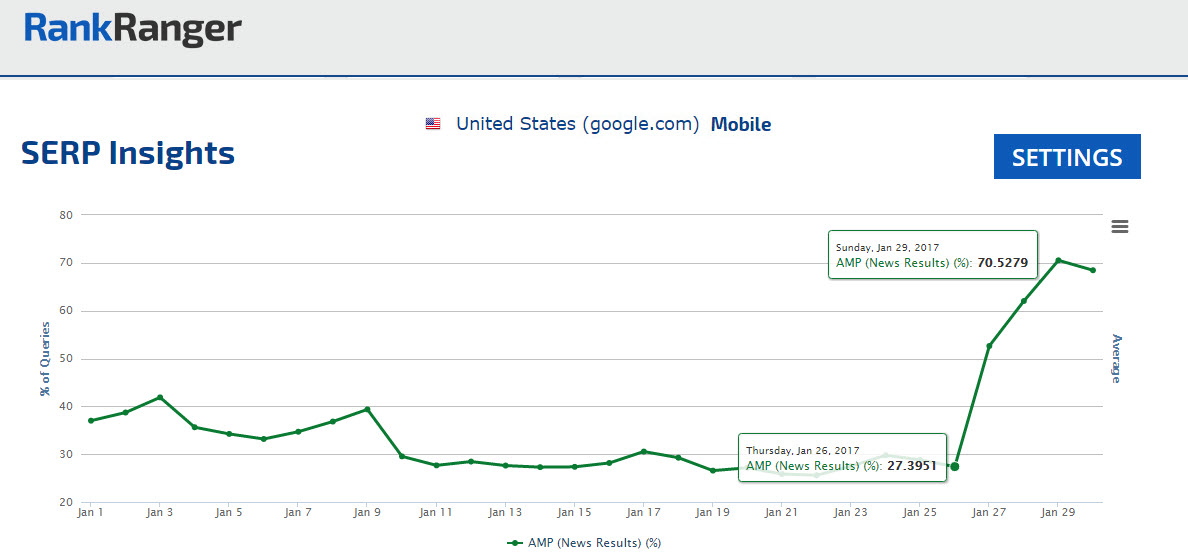Publishers are seeing mixed results from Google AMP pages, but it just got even more important for news publications
According to Rank Ranger, who has been tracking the presence of Google AMP pages in mobile search results, only a quarter of pages that ranked in Google’s Top Pages were AMP pages at this time last year. It stayed fairly steady at that rate throughout 2016. But as of last week, more than 50% of these search result listings were AMP pages across the globe, with a rate of 68% in the US. This shows preference for Google AMP pages in Google News results, like their Top Pages listings.
[text_ad]
Rank Ranger writes, “Generally taking place between January 26th and 29th, we first tracked the increase in AMP optimized new results in the US. Where on January the 25th we had seen only about 30% of mobile News Box results in the US showing as AMP, that number more than doubled via a 70% showing on January 29th. ”
They wrote, “This data event was replicated across the globe with huge increases across the board. Take France for example, on January 25 – 26 AMP within news results was statistically 0%. Yet, just a few days later 78% of all News Box results on the French mobile SERP were AMP. ”
So what does this mean, exactly? We think it means that Google is preferring to show AMP pages when it comes to news. Given that AMP pages, without customization, are totally devoid of important conversion architecture elements, this could be scary news for smaller news publishers who haven’t yet moved to AMP, or worse, have moved but haven’t customized their Google AMP pages.
If that’s you, there are WordPress plugins like Custom AMP that will allow you to customize these pages, and many resources on the topic, like Amp by Example. Finally, Google has put together information on how to track AMP pages, too.
Is Google AMP really helping publishers?
In an article in the New York Times, tells the story of Federico Viticci, publisher of MacStories, who decided to stop using AMP (although he might be rethinking that now.)
“Mr. Viticci said MacStories’s pages already loaded quickly without Google’s help. He also didn’t like the idea of Google’s obscuring his site’s links — with AMP, they read google.com instead of macstories.net — in the interest of expediency.”
But, the Times article notes, “AMP has delivered on its promise of faster mobile web pages. Even so, publishers — of smaller sites, especially, or individual bloggers — are beginning to worry about giving too much control to Google in exchange for zippier web pages. What’s more, Google’s approach to AMP has rankled some critics already suspicious of the company’s outsize influence on the internet.”
And they aren’t wrong. “Much of the publishers’ unease is rooted in Google’s presentation of AMP stories, which appear as if they are Google articles. That’s because Google, to speed up AMP, stores copies of publisher’s pages and serves them from its own internet network. So when a reader clicks an AMP link, the address bar at the top of the page displays google.com instead of the actual web address from the publisher,” the Times article says.
The article says that Google started AMP to compete with fast-loading platforms like Facebook Articles, even though we double that was stealing a very large portion of Google’s traffic. And, “David Gehring, a former Google employee and the chief executive of Relay Media, a company that works with publishers to convert pages to AMP, said the format had been positive for publishers grappling with shrinking revenue in the shift from print to online advertising. He estimated that up to 10 percent of mobile web content was already on AMP.”
Mark Silverstein, the head of business development at The Huffington Post confirms, saying, “Google has been a good partner…When they make decisions, they do a good job of explaining why they reached that decision.” And according to the Times article, “Emily Smith, head of content operations at Condé Nast’s Wired magazine, said supporting AMP had pushed its mobile articles to the top of search results. ” Other benefits, include The Washington Post saying that 15% of their traffic comes from AMP, and The Post says users scroll deeper on AMP pages.
I’d love to hear your thoughts, worries, and any positive or negative experiences with AMP in the comments below.




To me, the big issue is that Google AMP does nothing site owners can’t do themselves if they’re serious about performance optimization. A well-optimized website coupled with a content distribution network and caching can achieve much the same results. Ultimately, AMP does offer a shortcut to a faster site, reducing the amount of work site-owners have to do.
So ultimately, it’s going to be a give and take with publishers who need to decide how much they’re willing to give.